TinkaCode: The sibling-led startup bringing robotics and AI to Nakuru classrooms
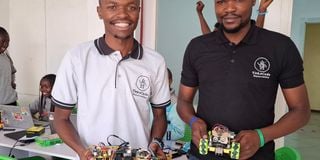
From left, Griffin Wigina and Nashon Wigina co-founders of TinkaCode, pose for a photo on August 13, 2025.
Two brothers in Nakuru are inspiring a new generation of young innovators by teaching children as young as seven about robotics, automation, the Internet of Things (IoT), and Artificial Intelligence (AI).
Nashon Wigina, 28, who has a background in mechanical engineering, and his younger brother Griffin Wigina, 23, who has a background in cybersecurity with a keen interest in robotics and the IoT, say their mission is to prepare children for the future of technology.
“We started TinkaCode after noticing a gap in early exposure to practical technology skills in children. While many children are familiar with using gadgets, few understand how they work or how they can be built. This is the knowledge we aim to impart through our hands-on lessons and creative projects,” Nashon says.
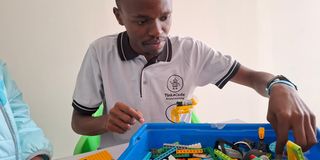
Griffin Wigina, co-founder of TinkaCode, assists a student in learning the basics of programming using lego blocks on August 13, 2025.
Founded in 2021, the two run TinkaCode by going to schools to introduce young learners to coding and other science, technology, engineering, and mathematics (STEM) skills as early as possible.
“Before that, we were mainly dealing with tech and building projects for others,” he says. “We realized that everything was moving towards tech in almost every industry, and we needed to find a way to introduce this to learners in various schools.”
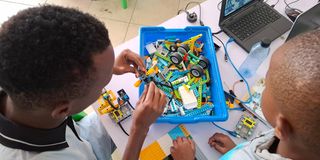
Griffin Wigina, co-founder of TinkaCode, assists a student in learning the basics of programming using lego blocks on August 13, 2025.
Nashon says he also noticed a shift in traditional engineering, and they wanted to help the younger generation adapt to that shift.
During their school visits, they observed that most students were not aware that they could choose software programming as a viable career and often settled for traditional fields like medicine or civil engineering.
“Countries in the West and parts of Asia already introduce programming to children as young as nine. That inspired us to act because Kenyan students will inevitably encounter technology in all fields, whether engineering, teaching, or accounting,” he says.
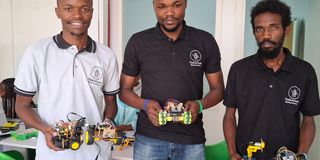
From left, Griffin Wigina, Nashon Wigina and Allan Lengima pose for a photo on August 13, 2025.
“The gap between playing a video game and understanding how to build one needed to be bridged. We wanted to bridge that gap by moving children from simply using technology to understanding how it works.”
Since its inception, the brothers say they have invested between Sh300,000 and Sh500,000 in their start up. The high cost of suitable robotics kits has been another hurdle, as the field is still new in Kenya.
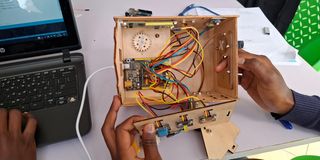
Student at TinkaCode holds a prototype they've built on August 13, 2025.
“Convincing schools to adopt programming in early education has often been met with resistance or passive acceptance, and many parents also fail to see the value of such training. We often have to convince them that programming can also be a career,” Nashon says.
Currently, TinkaCode has 20 enrolled learners between the age of 7 and 17 years for the holiday program and works both in primary and high schools as well as offer private sessions. Tuition fees range between Sh7,000 and Sh10,000 per month, depending on the program’s scope, the learner’s age, and availability.
They opened a physical space last month with the aim of encouraging learners to come and study at any time during the week. Lessons do not close for holidays, and going forward, they will run concurrently with the school programme, so learners can attend after school or at the weekend.
One of their notable success was when some of their students won awards at national competitions for standout projects such as an automated irrigation system and a smart home prototype that earned recognition in recent contests.
Looking ahead, TinkaCode is exploring partnerships, including with the Raspberry Pi Foundation, to give learners access to global tech networks and resources.
“Our vision is to introduce such programs to as many schools as possible, ensuring that all have basic programming training and that teachers, who currently lack the capacity, are also trained. In addition, we envision tapping into the African ecosystem and building the capacity of African students in tech,” Nashon says.


